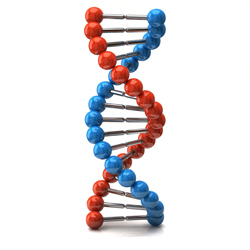Criminal cases being decided based on 'high-sensitivity' DNA analysis that experts are debating

Image from Shutterstock.
Judge and juries are being asked more and more to decide criminal cases based on “high-sensitivity” DNA analysis—which amplifies extremely faint, sometimes second hand samples—despite the fact that DNA experts themselves debate its accuracy, the Associated Press reports.
New York prosecutors are among the most aggressive in using so-called low-copy DNA samples obtained by collecting just a few human cells on items such as guns, knives and clothing. The FBI refuses to run such tests in its laboratories. Though the FBI is studying the use of low-copy DNA analysis, it says for now that it hasn’t “demonstrated the necessary reliability for use in forensic casework.”
“If the experts in the DNA field cannot agree on the weight to be given to evidence produced by high sensitivity analysis, it would make no sense to throw such evidence before a lay jury,” said Brooklyn state Supreme Court Justice Mark Dwyer last year when refusing to admit into evidence a sample taken from a bicycle in an attempted murder case.
A defense lawyer in that case, Jessica Goldthwaite with the Legal Aid Society’s DNA unit, said the amplified samples are more likely to be contaminated, noting that when “you shake my hand and then I touch a gun, your DNA could end up on the gun.”
The low-copy DNA samples are less than 100 picograms, equivalent to about 16 human cells.
The technique was used in the case of Amanda Knox, an American college student charged with murdering her roommate in Italy. It helped convict her, but a forensic report found the evidence unreliable and possibly contaminated, which helped exonerate her—twice. It also was used in the prosecution of hip-hop performer Lil Wayne in New York for possession of a gun found on his tour bus, though he subsequently pleaded guilty.
New York prosecutors regularly use low-count DNA analysis. The New York City medical examiner’s office it uses the protocol in about 10 percent of the DNA cases it analyzes. It says it has done 7,500 of the tests since 2005, and its scientists have testified in 250 cases in state and federal courts.
“Removing it as a tool for police and prosecutors would lead to significant setbacks in 21st century evidence-gathering techniques,” said Emily Tuttle, spokeswoman for Manhattan District Attorney Cyrus Vance, Jr.
But there might be significant controversy within the medical examiner’s office. Last week Dr. Marina Stajic, the longtime director of the offices Forensic Toxicology Laboratory filed suit against the city, saying she was fired for seeking more transparency concerning the office’s own research into the accuracy of the amplified DNA testing, the New York Times reported.
Write a letter to the editor, share a story tip or update, or report an error.


